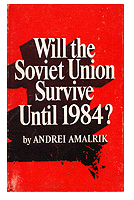Andrei Amalrik, a leading Russian dissident, was expelled from Moscow University in 1963 for political reasons and then two years later sentenced to two and a half years exile in Siberia (described in his book, Involuntary Journey to Siberia).
Allowed to return to Moscow, he was systematically prevented from working by the KGB and eventually placed in a labor camp. He was finally expelled from the Soviet Union in 1975 and died in a car accident in Spain in 1980 (Bit mysterious were those circumstances).

Natan Sharansky, another Russian dissident, wrote: "I was arrested in 1977 on charges of high treason as well as for "anti-Soviet" activities. After my own mock trial a year later, I was sentenced to thirteen years in prison. In 1984, my KGB jailers, swelling with pride, reminded me of Amalrik's prediction: “You see, Amalrik is dead” — he had died in a car accident in France in 1980 — “and the USSR is still standing!”" at www.nationalreview.com/comment/sharansky200412070832.asp).
"His first contact with KGB anti-dissident operations was when he was trying to get in touch with a Danish scientist in order to get views on a study he had written on Slav-Scandinavian relations during the 9th century. Instead of forwarding the text of Mr. Amalrik to the Danish scientist, the Danish embassy in Moscow turned it over to the KGB!" [Not good] (See www.contra.nu/English961.html)
 |
Amalrik published Will the Soviet Union Survive 1984? abroad in 1970 and chose his title to remind readers of George Orwell's novel, 1984, which was also directed at the Soviet Union--took me awhile to find my copy of this small book tucked away on my bookshelves. |
Ok, in some respects Amalrik was wrong. The Soviet Union did last a few years past 1984 (maybe it is still in existence, but "Russia" could still fall to pieces at any time). The Soviet Union also did not end as a result of war with China (but that could still happen) nor was there a huge explosion of ethnic violence. (But there has been an ethnic fragmentation of what was the Soviet Union, and there is still the situation in Chechnya.)
But maybe Amalrik was right. He wrote, "As the regime's difficulties mount and as it appears ever more incapable of coping with its tasks, the 'middle class' will grow increasingly hostile....Simultaneously, the nationalist tendencies of the non-Russian peoples of the Soviet Union will intensify sharply, first in the Baltic area, the Caucasus and the Ukraine, then in Central Asia and along the Volga." (Amalrik, Will the Soviet Union Survive, p. 63; also in "Letters to the Editor," International Herald Tribune, Wednesday, 22 January 1992, www.iht.com/articles/1992/01/22/edle_4.php)
In some other respects, Amalrik was probably right; primarily in his focus on the destructive nature of the Russian psyche (or the "Russian Soul" to borrow an old phrase from Russian scholars) and in his view that, "Whether because of its historical traditions or for some other reason, the idea of self-government, of equality before the law and of personal freedom--and the responsibility that goes with these--are almost completely incomprehensible to the Russian people...To the majority of the people the very word 'freedom' is synonymous with 'disorder' or the opportunity to indulge with impunity in some kind of antisocial or dangerous activity." (Amalrik, Will the Soviet Union Survive, pp. 33-34; also misc.eunet.cz/marathon/97/mar974_p11.htm)
Natan Sharansky (www.nationalreview.com/comment/sharansky200412070832.asp):
"Amalrik, to whom I would later have the privilege to teach
English, explained that any state forced to devote so much of its
energies to physically and psychologically controlling millions of its
own subjects could not survive indefinitely. The unforgettable image he
left the reader with was that of a soldier who must always point a gun
at his enemy. His arms begin to tire until their weight becomes
unbearable. Exhausted, he lowers his weapon and his prisoner escapes.
While many in the West hailed Amalrik's courage — he was imprisoned for
years and exiled for his observations — almost no one outside the
Soviet Union took his ideas seriously. When he wrote his book,
short-sighted democratic leaders were convinced the USSR would last
forever, and according to many economic indicators, the Soviet Union
appeared to be closing the gap on the U.S. Amalrik must have seemed
downright delusional.
But inside the USSR, Amalrik's book was not dismissed as the ranting of
a lunatic. The leadership knew that Amalrik had exposed the Soviet
regime's soft underbelly. They understood their vulnerability to
dissident ideas: Even the smallest spark of freedom could set their
entire totalitarian world ablaze. That's why dissidents were held in
isolation, dissident books were confiscated, and every typewriter had
to be registered with the authorities. The regime knew the volatile
potential of free thought and speech, so they spared no effort at
extinguishing the spark.”